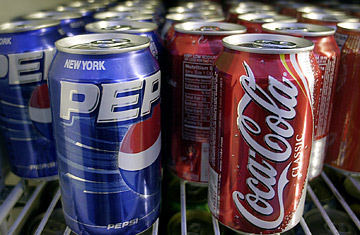
You would think that as sellers of small pleasures, Coke and Pepsi would be poised to ride out this rough economy on similar waves. But Coke has turned in strong earnings lately while Pepsi has lagged. The divergence in performance stems less from an evolution of American tastes than from a gradual parting of strategic paths. The cola twins differ more and more in their nonbubbly portfolios.
Coke has focused on supplementing its signature soda brands with water (Vitamin Water), juice (Odwalla) and other noncarbonated drinks, answering critics who lambasted the company for being a lightweight in the nonsoda segment of the beverage business. To keep up its momentum, Coke recently bought a 40% stake in Honest Tea, an organic-bottled-tea upstart. Pepsi, which owns Gatorade and Tropicana, was already well positioned, so it steadily ramped up its focus on snack foods. Its Frito-Lay division now accounts for 56% of Pepsi's annual retail sales. Over the past decade, that product diversity has helped Pepsi catch up to its rival. This year, though, rising commodity costs in the first three quarters have temporarily burdened Pepsi's diversification. (See the Top 10 TV ads.)
Beyond its trademark cola, Pepsi has 17 distinct brands, ranging from Lay's and Doritos to Cheetos and Quaker Foods, that each generate more than $1 billion a year in sales. That's a power portfolio by any measure. But this year has taken a big bite out of the company's profitability. Cost inflation of close to 10% in 2008 means each bag of chips has cost Pepsi more to produce, even as belt-tightening consumers resist paying more for their food. Earlier this year, skyrocketing prices for corn, rice, wheat, vegetable oils and other key ingredients further added to core expenses, shrinking Pepsi's margins. Even packaging and delivery costs have risen. In response, CEO Indra Nooyi recently announced that the company would lay off 3,300 of its 185,000 workers and close six manufacturing plants, after failing to satisfy analysts' performance expectations. Coke has been less affected by commodity-price growth because it buys a smaller range of ingredients.
Coke also looked ahead with greater acuity. Analyst Erin Ashley Smith of Argus Research, an independent New York City research firm, says Coke impressed investors with its presciently conservative outlook on the economic climate, while Pepsi started the year with overly optimistic assessments. Smith says Pepsi has had some operational problems as well, noting that the company has periodically had a tough time meeting demand for Gatorade and keeping store shelves stocked — an uncharacteristically subpar performance from a company that prides itself on operational excellence.
